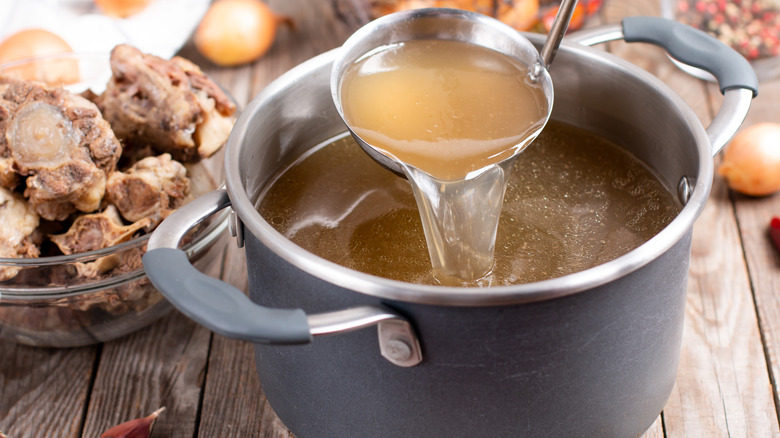What Makes Nigerian Stock Unique?
When visiting Nigeria, you'll be treated to either dry or rainy weather and notice an abundance of fish in rivers, guinea fowls in the northern savanna, and golden cats in national parks, per Britannica. But aside from the climate and animal life, the word "variety" also extends to Nigeria's food scene.
Food in Every Country explains that Nigeria's diverse cuisine is composed of numerous regional dishes. For instance, northern Nigeria offers plenty of suyas (a type of kebab), as well as beans, brown rice, and sorghum. In the East, the dishes are based around dumplings, pumpkins, and African yams, which are less sweet than their American counterparts and are used to make isu, or, spiced boiled yams.
Speaking of recipes, Nigeria is famous for soups, stews, peppered snails, jollof rice, and cow legs with a spicy palm oil sauce (via Keobi and Easy Shop Easy Cook). The foundation for many of their broth-based dishes comes from stock, much like chicken noodle soup and gumbo in the United States.
But a simple chicken stock just won't cut it in Nigeria, as their bold dishes call for an even bolder type of stock.
It utilizes Nigerian curry powder
For comparative purposes, let's first highlight what makes up Western-style stocks. Serious Eats notes that celery, carrots, and white or yellow onions are typically used, as well as one meat source, like chicken or beef. These ingredients, along with water and some herbs (per La Petit Noisette) are simmered for several hours.
Nigerian stock, on the other hand, is boiled first and then simmered for roughly 45 minutes (via Serious Eats). The result is strong meaty flavors from the meat and bones without the gelatinous consistency. Instead of a mirepoix, this type of stock utilizes garlic, ginger, red onion, green bell peppers, bay leaves, curry powder, optional habanero peppers, and thyme leaves. Easy Shop Easy Cook also notes that various parts of chicken, beef, and/or fish are used for the stock. When making fish stock, fins, fish heads, and fish bones are often incorporated. For beef stock, cow legs, shins, and offal (organs) may be used.
The "cherry on top," so to speak, comes from the use of Nigerian curry powder, which is a blend of several other seasonings, per The Spruce Eats. Some of these include ground coriander, ground ginger, cayenne pepper, mustard powder, and ground fenugreek, so there are varying notes of heat, earthiness, sweetness, and bitterness.
The result? A bright yellow stock that's spicy, warm, herbaceous, and perfect for a variety of Nigerian recipes.
What dishes highlight Nigerian stock?
Serious Eats notes that Nigerian stock is an important base for both traditional and modern recipes, including broth-based dishes as well as the popular jollof rice.
For jollof rice, rice is cooked in a combination of stock, sautéed spiced onions, a blended tomato-onion-and-pepper mixture and more spice (via Food52). Because Nigerian stock is made with many spices, seasonings, and aromatics, the resulting dish is bold and flavorful.
According to Easy Shop Easy Cook, Nigerian meat stock adds warmth and spice to dishes like ogbono (wild mango seed) soup, okra soup, egusi (melon seed) soup, and afang (spinach and okazi leaves) soup. Fish stock, on the other hand, is found in dishes like beans pottage (porridge) and moi moi, a steamed bean dish that utilizes crayfish, tomato puree, and scotch bonnet or habanero peppers (per All Nigerian Recipes).
When you take a bite of any of the above dishes, you are hit with a burst of warm, aromatic flavors, and that's all thanks to the Nigerian stock. If you wanted to make any of these signature Nigerian dishes at home, having a well-made stock as the base will set you up for success.


